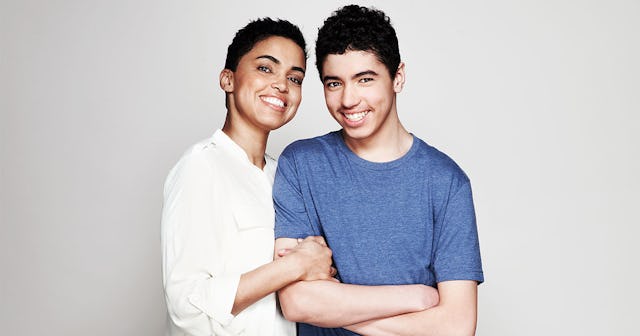Having My Teenage Son Home This Year Has Brought Us Closer Than I Would Have Imagined

It used to be that the only way I could find out what was going on with my 15-year-old son was via the parents of his friends. Their kids would give them the field trip and spelling bee and yearbook information, would keep them abreast of all the positive and negative and mundane of their social lives, and then their parents, taking pity on me for being perennially clueless, would pass along the info. I never knew WTF was going on, because my kid never told me.
Not that my son was deliberately withholding. He’s not what I’d call the “quiet type,” either. He just has different priorities for what he thinks is relevant to share with me. Theories about the possibility (or impossibility) of time-travel? A worthy topic of conversation. Letting me know he offered support to a friend with whom a teacher had been inappropriate? Apparently not relevant. He’s just never been the kind of kid who talks about his day.
When he was still attending school in person, I’d pick him up and ask questions every way I could imagine. They say it’s important to ask open-ended questions rather than yes-or-no questions, to encourage your child to open up. But my kid always found a way to keep his answers vague and under 10 words. His friends’ parents are now my friends. We became friends via sharing about our kids.
But since the pandemic hit, the way I get information about my teenage son has changed. I no longer learn about what he’s up to through the parents of his friends. I get it from him now. I think the pandemic, just the existence of it, was the first conversation trigger. Suddenly, we had time to talk. We’d never, ever had empty hours spreading before us where we could just sit and talk — where, often, I was one of the few people my son could talk to. From the outset, he wanted to hash through his thoughts about COVID-19 — about the number of cases, the studies that were being done, the likelihood of death given age and other risk factors.
When George Floyd was murdered, we had frank discussions about racial inequity and systemic racism. My children are Latinx, but their financial privilege affords them protection from the kind of are-you-legal racism they know others from their community often face. Racism is an ongoing topic of conversation in our family, but my son didn’t always have much to say about it. Whatever he thought, he kept most of it inside. After Floyd’s murder, though, as protests erupted in the U.S. and across the world, and I suppose because we were holed up here together with nowhere to go, my son slowly started talking more. We watched the protests unfold and talked about what they meant, and why they were so important and so long overdue. We watched documentaries together, pausing often to talk through what we were watching.
When school started in the fall, we opted to do virtual school, which meant we were going to have even more time together. Academically, my son struggled at first to find a rhythm. The go-at-your-own-pace system wasn’t working for him, and he fell several weeks behind. I hung back at first, giving him a chance to catch up on his own, but he slipped further behind with each week that passed. When he broke down in tears one day from the stress, I sat for a few hours and combed through all the assignments he had left and created a daily color-coded schedule for him to make sure he would finish fall semester on time.
He was immensely relieved to have a daily schedule, and he thanked me sincerely for the hours of work I’d put in to help him. He’d seen me sitting there working for hours, purely for his benefit. Of course, a parent sacrificing time for their kid isn’t unusual. But it was unusual for him to be able to witness it. I had this moment where I felt like we were really seeing each other — I was seeing how much he honestly cared about school, and he was seeing how much I wanted him to succeed, not in a “get your work done!” kind of way, but in an “I care about you and I want to help” kind of way.
The proximity this year has foisted upon us has allowed me to bond with my son in a way that I’m not sure would have been possible had this been a year full of school and activities and the constant rushing around that had become our normal. He still takes guitar lessons, and he still has a social life, though these things have moved online — he plays online games with his gamer friends every night while simultaneously watching science videos on YouTube and texting his friends who aren’t into gaming.
Still, on a daily basis, I talk with my son more than I ever have before. I finally feel like, after years of brief, non-committal responses to my efforts at getting to know him, I finally have at least some idea of what he’s thinking. I can ask him a question and not just get an answer, but actually have a complete conversation. I’m still his parent, but I see us becoming friends, too, as much as a mother and her teenage son can realistically call themselves “friends.” The point is, we enjoy each other’s company. The pandemic is terrible in a million different ways, but bonding with my kid is one amazing positive I’m grateful to be able to embrace.